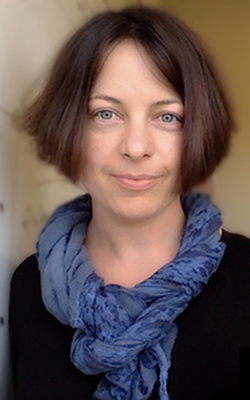Olga Dudko Receives Prestigious Simons Investigator Award
UC San Diego researcher is recognized for bringing theoretical sophistication of physics to life sciences
Published Date
By:
- Michelle Franklin
Share This:
Article Content
 University of California San Diego Professor of Physics Olga Dudko has been named a 2022 Simons Investigator, one of the most prestigious awards for a theoretical research scientist. Dudko, who was among 16 researchers worldwide to be awarded, is a theoretical physicist whose work seeks to establish unifying physical principles in biology.
University of California San Diego Professor of Physics Olga Dudko has been named a 2022 Simons Investigator, one of the most prestigious awards for a theoretical research scientist. Dudko, who was among 16 researchers worldwide to be awarded, is a theoretical physicist whose work seeks to establish unifying physical principles in biology.
Simons Investigators are supported by the Simons Foundation, whose mission is to advance the frontiers of research in mathematics and the basic sciences. Investigators are nominated by their institutions and those selected receive at least five years of research support totaling more than $500,000. The intent of the program is to support outstanding theoretical scientists in their most productive years, when they are establishing creative new research directions, providing leadership to the field, and effectively mentoring junior scientists.
“I am honored to receive the Simons Investigator award ,” Dudko stated. “It is thrilling to be part of the ambitious endeavor of building a theoretical physics of living systems that has the potential to fundamentally change the way we think about life.”
Dudko’s research explores the phenomena of the living world. It is driven by the notion that deep, physics-based conceptual approaches can encompass living-system complexity. The field of physics is governed by unifying theories including thermodynamics, relativity and quantum mechanics. Such unifying quantitative perspectives are non-existent or underdeveloped in most areas of life sciences, but Dudko has developed an approach that has forged fundamentally new understanding in biology. Her theoretical work has had significant impact for experimentalists, both physicists and biologists, providing them with new ways to analyze and interpret their data and point to new experiments.
Dudko’s research strives to find a unifying understanding of the seemingly unrelated and diverse processes in biology through simplifying and powerfully predictive theories rooted in physics. The Dudko-Hummer-Szabo theory has been widely adopted by experimentalists to extract kinetic information from experiments on biological macromolecules, uncovering the molecular mechanisms that enable biological function in living systems.
Dudko routinely crosses the boundaries between disciplines, bringing a level of generality, mathematical rigor and predictive power to biology that are standard in physics in the contexts of inanimate matter. Dudko’s research interests have spanned magnetism, the origin of friction at the nanoscale, single-molecule force spectroscopy, virus-host cell interactions, spatiotemporal organization of chromosomes in the cell nucleus and neuronal communication. A signature of Dudko’s work is its emphasis on analytically tractable (as opposed to purely numerical) theories, which help build intuition about the system under study and enable a direct application to experimental data.
Recently Dudko’s lab developed a theory of synaptic transmission which showed that all chemical synapses—regardless of size, rate of neurotransmitter release, and other characteristics—displayed universal patterns of behavior. This work fills the void between the wealth of experimental data on the kinetics of synaptic transmission and the needed theory with which to analyze and understand these data. It also provides a quantitative physical framework that other researchers can use to address questions about synaptic plasticity and other synaptic functions. The theory may even help inspire the design of artificial intelligence.
As an instructor, Dudko has been a strong advocate of transmitting the unique intellectual style of physics—with its emphasis on general principles, quantitative predictions, the value of simplification and the deep connections between distant subfields—to students in biological physics. Convinced that biological physics must become a mainstream course in all modern physics departments, Dudko developed and taught the course “Biological Physics” for graduate and advanced undergraduate students. Unlike traditional biophysics courses that are often fragmented along the lines defined by the subfields of biology, Dudko’s teaching style is based on theoretical principles that unify disparate living systems across many scales, yet connect to the details of specific systems, as in traditional areas of physics.
UC San Diego Chair of the Department of Physics Brian Maple commended Dudko as a groundbreaking researcher and gifted lecturer. “Over the past few years Professor Dudko has taken physics into new areas of life sciences where no tradition of theoretical physics approaches existed,” he stated. “Her courses have become a cornerstone of the biophysics curriculum at UC San Diego, and she is praised by her students—many of whom have gone on to their own successful careers in academia. She is very deserving of this recognition.”
Dudko completed her undergraduate and doctoral work in physics in Kharkiv, Ukraine, and was a postdoctoral researcher in Tel Aviv University and the U.S. National Institutes of Health until 2007, when she joined the UC San Diego Department of Physics.
Share This:
You May Also Like
UC San Diego is Strengthening U.S. Semiconductor Innovation and Workforce Development
Technology & EngineeringStay in the Know
Keep up with all the latest from UC San Diego. Subscribe to the newsletter today.



